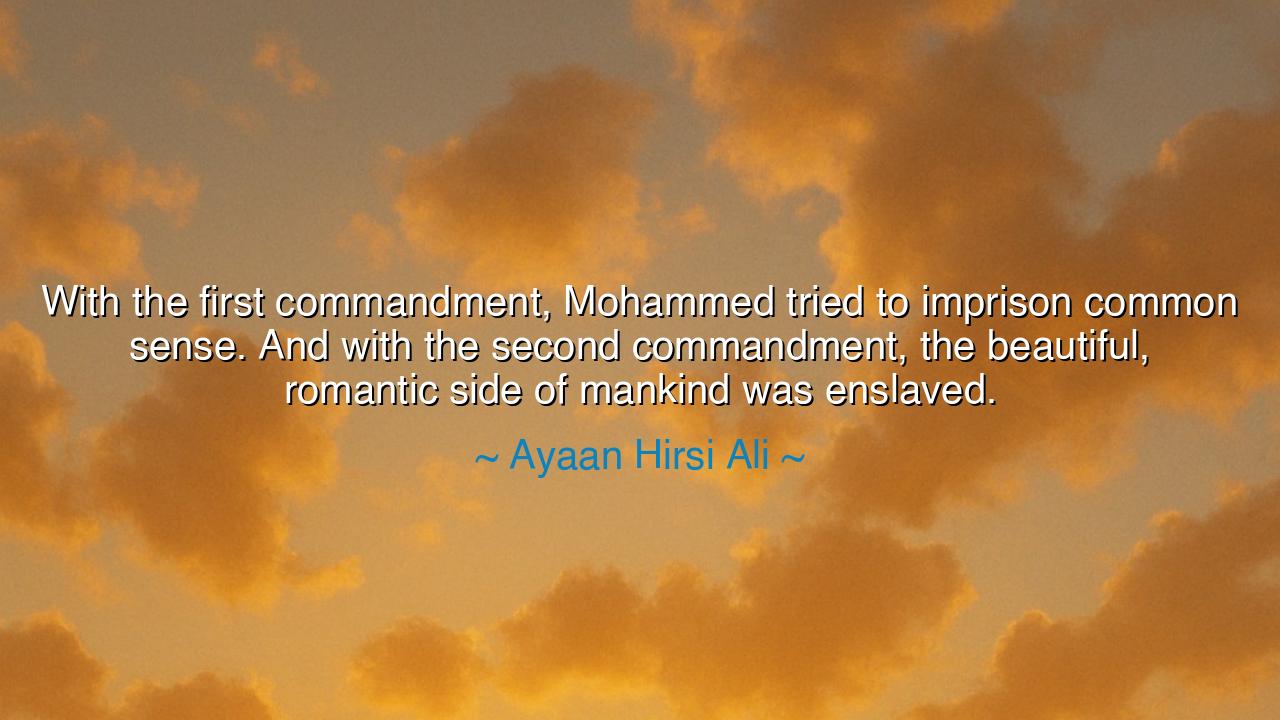
With the first commandment, Mohammed tried to imprison common
With the first commandment, Mohammed tried to imprison common sense. And with the second commandment, the beautiful, romantic side of mankind was enslaved.






Listen, O children of wisdom, to the words of Ayaan Hirsi Ali, who speaks with boldness and conviction about the consequences of religious doctrine on the human spirit. She said, “With the first commandment, Mohammed tried to imprison common sense. And with the second commandment, the beautiful, romantic side of mankind was enslaved.” In these words, Hirsi Ali delves into the impact of certain religious teachings on the freedom of thought and the expression of love. She suggests that the very foundation of faith—as laid out in the commandments—seeks to confine the human mind and the heart, limiting both the rational intellect and the emotional depth of humanity. Her words call us to examine how dogma can shape and sometimes stifle the essence of what makes us human.
In the ancient world, there were many philosophies and beliefs that sought to guide humanity, but also to limit its desires and ambitions. The Greek philosophers, like Socrates and Plato, sought to liberate the mind by urging us to question everything and to seek knowledge through reason. They believed that the pursuit of wisdom was the highest good, and that reason would lead to the best understanding of the world. Socrates was not imprisoned by the ideas of others but instead sought to challenge the beliefs of his time, asking questions that led to a deeper understanding of truth. In contrast, Hirsi Ali’s words about the first commandment imply that religion, in some forms, can impose limitations on this very freedom of thought, urging the believer to accept certain truths without question, effectively imprisoning the mind.
Yet, it is the second commandment, which is often interpreted as forbidding idolatry or the worship of images, that Hirsi Ali believes strikes at the heart of the romantic side of mankind. In many cultures throughout history, the expression of love, beauty, and desire has been symbolized through art, poetry, and rituals that honor the sensuous and the beautiful. The romantic, with all its passion and yearning, has been the fuel of great literature, music, and art. The Greeks, in their worship of Aphrodite, embodied this love for the beautiful and the sensual, finding in it a celebration of the human spirit. But when religious doctrine forbids the celebration of the sensuous and the romantic, as it sometimes does with strict interpretations of the second commandment, it enforces a kind of spiritual suppression, a denial of the very essence of human emotion and expression.
Consider the story of Michelangelo, the great Renaissance artist, whose works like the Creation of Adam on the ceiling of the Sistine Chapel are filled with intense beauty and passion. Michelangelo’s art was a celebration of the human form and the spirit—a reflection of the romantic and divine beauty he saw in the world. Yet, his work was often at odds with the rigid religious dogmas of his time, which sought to limit artistic expression and focus only on the spiritual and the abstract. The Church, in its attempt to control the physical, sought to impose a certain restraint on the beauty of the world. Yet Michelangelo’s art, like that of many great creators throughout history, broke free from these constraints and became a symbol of human triumph over dogma, the triumph of the romantic, the beautiful, and the intellectual.
Hirsi Ali’s statement challenges us to reflect on the ways in which doctrines and commandments can shape our perceptions of love, art, and freedom. The first commandment, in her view, can limit common sense by demanding blind faith without room for reason. The second commandment, with its restriction on idolatry, can suppress the natural romantic impulses that have given rise to some of humanity’s most beautiful and inspiring works. In the quest for freedom, we are reminded that reason and romanticism are not enemies, but partners in the pursuit of a deeper understanding of both ourselves and the world around us.
The lesson here, O children, is that we must question all doctrines that seek to suppress the mind and the heart. True wisdom comes not from blind obedience, but from the willingness to embrace both reason and romance, to celebrate beauty and freedom, while seeking a path that honors both our intellect and our emotions. Just as Socrates challenged the ideas of his time, so too must we challenge the doctrines that seek to limit our understanding of truth and love. The romantic impulses that dwell in our hearts should not be suppressed but embraced as part of our human nature, and our rational intellect should be allowed to flourish alongside them.
And so, O children, I say unto you: Seek balance between reason and romance in all aspects of life. Question the doctrines that seek to imprison your mind and heart, and instead, embrace the freedom to love deeply, to think critically, and to create without fear of suppression. Like the great artists, philosophers, and heroes of history, you too must learn to walk the path of truth and beauty, knowing that the two need not be at odds, but must coexist in the soul of the wise and the passionate. Through reason and romance, we shall find the truest form of freedom and the most profound expression of the human spirit.






AAdministratorAdministrator
Welcome, honored guests. Please leave a comment, we will respond soon